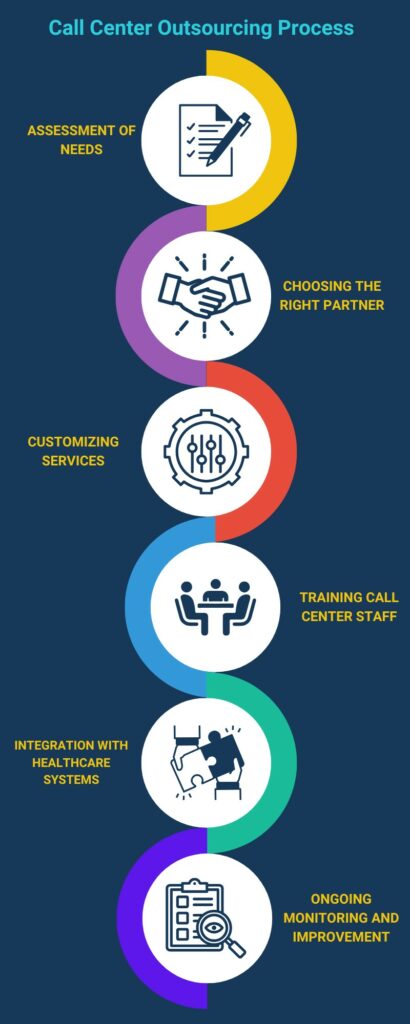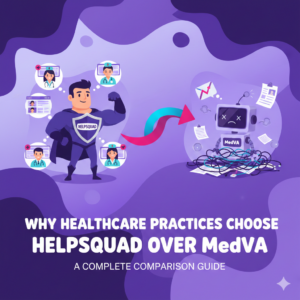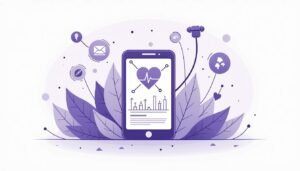The Impact of Medical Healthcare Call Centers to Patients and Physicians
02 Apr 2024 By: Mary Dellosa
Updated
Medical healthcare call centers are key in healthcare in this fast-paced industry. They link patients with doctors, making sure messages are fast and clear. Knowing how they work, what they do, and their effect on patient care shows their big value to both patients and medical teams.

Understanding Medical Healthcare Call Centers
Healthcare call centers are a central point for patient questions, booking visits, and giving important health info. They bridge patients and healthcare providers, making communication smooth and effective.
Medical call center services have skilled staff trained in medical terms and rules. They get thorough training to accurately and kindly answer many patient questions. With these experts, call centers offer patients the info and support that they need.
The Role of Call Centers in Healthcare
In the healthcare field, call centers are crucial for smooth patient care. They connect healthcare providers and patients, giving quick, correct help with medical questions, scheduling, and health info.
Medical call centers work 24/7, giving patients help and info any time. This round-the-clock service means patients get support when needed, less staff turnover, leading to better satisfaction and outcomes.
Key Services Provided by Healthcare Call Centers
Healthcare call center outsourcing provide many services like booking visits, patient outreach, refilling prescriptions, automated appointment reminders, checking lab results, explaining insurance, and giving medical advice in a timely manner. They play a key role in offering full healthcare support to patients and doctors.
Some high-tech call centers use AI and data analysis to boost their services. These tools make processes smoother, speed up responses, and tailor patient talks. With advanced technology, call centers keep up with healthcare changes, meeting the growing needs of patients and doctors.
Benefits of Outsourcing Healthcare Call Center Solutions
Doctors benefit greatly from healthcare call centers. These centers improve their practice efficiency and effectiveness.
Call centers boost both patient care and medical practice efficiency. They transform daily work for doctors and staff, leading to better patient results and practice performance. Outsourcing to healthcare call centers are also a good cost-effective solution as they don’t need to have an office space to do the work.

Streamlining Administrative Tasks
Doctors can concentrate on caring for patients when healthcare call centers manage bookings and insurance tasks. This lets medical staff spend more time on quality patient care.
By shifting admin work to call centers, doctors face less stress and burnout. This lightens their load, letting them focus on top medical care and better patient relationships. Agents are flexible in working with different admin tasks such as processing invoices, working on data entry backlogs, answering incoming calls, processing billing requests, and even insurance verification.
Facilitating Better Patient Management
Call centers help manage patients by offering current information on their history, medications, and test results. This gives healthcare providers a full view, helping them make informed choices and offer personalized care.
Integrating call center data with electronic health records (EHR) lets doctors quickly access vital patient information. This boosts care coordination, cuts medical errors, and leads to a more efficient, patient-focused healthcare process.
Healthcare Call Center Outsourcing Process: A Step-by-Step Guide
Outsourcing healthcare call centers requires a clear plan to ensure smooth operations and high-quality service. Here’s a step-by-step guide on the process and its advantages.
- Assessment of Needs: Healthcare providers assess their current administrative and patient communication needs, identifying areas where call center outsourcing can improve efficiency and patient satisfaction.
- Choosing the Right Partner: Healthcare organizations select an outsourcing partner with experience in medical call center services, ensuring they comply with industry regulations like HIPAA.
- Customizing Services: The outsourcing partner customizes call center services based on the healthcare provider’s specific requirements, such as appointment scheduling, patient outreach, or insurance verification.
- Training Call Center Staff: The outsourced team receives comprehensive training on medical terminology, patient interaction, and compliance with healthcare laws to maintain service quality.
- Integration with Healthcare Systems: Call centers integrate with Electronic Health Records (EHR) and other healthcare management systems to provide real-time access to patient information and streamline workflows.
- Ongoing Monitoring and Improvement: Continuous monitoring of call center performance ensures high service standards. Feedback loops and regular audits help optimize the patient experience and improve operational efficiency.
Outsourcing allows healthcare providers to focus on patient care, while the call center handles admin tasks. This boosts patient satisfaction and efficiency.

The Future of Healthcare Call Centers
As technology advances, healthcare call centers will grow, bringing new benefits and facing fresh challenges, making patient care even better.
AI and chatbots are changing healthcare call centers, making patient support faster and smarter. They can schedule appointments and give basic medical advice. These bots assess symptoms, suggest actions, and help sort patients by urgency. AI cuts wait times and boosts patient experience.
Telehealth, alongside AI, is revolutionizing healthcare call centers. It lets patients get medical advice remotely, cutting the need for physical visits. This eases patient access and lightens facility loads. With telehealth in call centers, doctors offer quick, efficient care, even to those far away or less mobile.
Trending now
Healthcare call centers face challenges like outdated technology, long hold times, and decentralized data, impacting patient experience negatively. AI solutions offer a fix with scalability, 24/7 support, and efficiency. Continuous training and patient feedback are key. AI can also automate tasks and personalize interactions. Advanced AI improves agent productivity, ensures round-the-clock accessibility, reduces wait times, and enhances personalized service. Introducing AI can transform patient experiences, making the first contact with healthcare providers positive and impactful.
It serves as vital communication hubs, manage patient calls with care and adhere to HIPAA regulations. Specialized in handling appointments, billing, and emergencies, they utilize advanced technology for efficient service. Patient dissatisfaction remains an issue, but adopting best practices and HIPAA-compliant VoIP solutions can enhance agent performance and patient satisfaction.
Technological Advancements and Their Implications
Emerging technology like AI, chatbots, and telehealth could transform healthcare call centers. They’ll make processes smoother, automate tasks, and enhance patient experience. This will also lessen call abandonment rates and help improve the call center’s performance metrics.
But, new technology brings challenges, like securing patient data. Call centers must boost cybersecurity, use encryption, conduct audits, and train staff to protect sensitive info and prevent breaches.
Integrating call centers with healthcare systems is challenging. They must link smoothly to EHRs and databases for real-time patient info access. Investing in compatible systems and data sharing is key to accurate, personalized help.
Potential Challenges and Solutions
Healthcare call centers face challenges like high call volumes, patient privacy, and system integration. HIPAA rules ensure patient data shared with healthcare call centers remains private and secure. Call center companies must ensure that the agents are expertly trained and follow HIPAA compliance strictly. Overcoming this requires solid infrastructure, thorough training, and strong protocols, boosting their ability to offer patient-focused care.
Handling many calls is crucial for healthcare call centers. To manage growing demand, they can use advanced call routing to prioritize urgent calls, resolve customer issues and predictive analytics to forecast call volumes. This helps adjust staff levels and ensures high service quality.
Truly affordable but high-quality healthcare tools and services are the only means by which quality healthcare can be provided to all.
– Muhammad Yunus
Conclusion
Healthcare call centers are at a tech turning point, set to change patient care. AI, chatbots, and telehealth could make services more personal, efficient, and reachable. Yet, addressing data security and system integration is key. Investing in infrastructure, training, and protocols will keep call centers central in patient care and healthcare’s future.
As healthcare evolves, efficient, patient-focused communication is key. HelpSquad BPO offers a perfect solution and provides contact center solutions with skilled virtual assistants and 24/7 service. Manage call volumes, perform quality assurance, ensure privacy, and integrate with systems starting at $8.50/hour. Transform your call center with HelpSquad BPO. Start a trial today for streamlined patient care.


